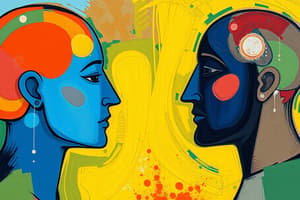Podcast
Questions and Answers
What is the definition of learning?
What is the definition of learning?
- A reaction to a stimulus
- A temporary change in behavior
- An involuntary response to an event
- A relatively permanent change in behavior or knowledge that comes from experience or training (correct)
What is associative learning?
What is associative learning?
A learning principle that states that ideas and experiences reinforce each other and can be mentally linked to one another.
What is classical conditioning?
What is classical conditioning?
A simple form of learning based on reflex or instinct that is paired with new stimuli.
Who was Ivan Pavlov?
Who was Ivan Pavlov?
What does behaviorism entail?
What does behaviorism entail?
What is an unconditioned stimulus?
What is an unconditioned stimulus?
What is a conditioned response?
What is a conditioned response?
What is acquisition in the context of learning?
What is acquisition in the context of learning?
What occurs during extinction?
What occurs during extinction?
What is spontaneous recovery?
What is spontaneous recovery?
What is generalization in behavior?
What is generalization in behavior?
What is the law of effect?
What is the law of effect?
What is operant conditioning?
What is operant conditioning?
What is reinforcement?
What is reinforcement?
What is positive reinforcement?
What is positive reinforcement?
What is negative punishment?
What is negative punishment?
Flashcards are hidden until you start studying
Study Notes
Learning and Associative Learning
- Learning is a relatively permanent change in behavior or knowledge resulting from experience or training.
- Associative learning links ideas and experiences, reinforcing connections between them.
Classical Conditioning
- A basic form of learning where reflexive behavior is paired with new stimuli.
- Involves an unconditional stimulus (US) which elicits an unconditional response (UR), and a neutral stimulus (NS) that becomes the conditioned stimulus (CS) after pairing with the US.
- Example: A loud noise (US) causes blinking (UR), while a bell (NS) becomes a signal for salivation (CS) through association.
Ivan Pavlov
- A Russian physiologist known for his experiments with dogs, leading to the formulation of classical conditioning.
Behaviorism
- Psychology should be an objective science focusing on observable behavior without considering mental processes. Most modern psychologists agree with its objective nature but not strict behaviorism.
Key Concepts in Classical Conditioning
- Unconditioned Stimulus (US): A stimulus that automatically triggers a response without learning.
- Unconditioned Response (UR): Automatic reaction to an unconditioned stimulus.
- Neutral Stimulus (NS): A stimulus that initially elicits no response until paired with the US.
- Conditioned Stimulus (CS): A previously neutral stimulus that elicits a learned response after association with the US.
- Conditioned Response (CR): A learned response to the CS that was previously neutral.
Processes in Classical Conditioning
- Acquisition: Initial stages of learning where the CS begins to evoke a conditioned response.
- Extinction: The weakening of a conditioned response when the CS is no longer paired with the US.
- Spontaneous Recovery: The sudden reappearance of a conditioned response after a rest period.
- Generalization: When similar stimuli to the CS elicit the CR.
- Discrimination: When a stimulus is different enough from the CS that it does not produce the CR.
Operant Conditioning
- Developed from Thorndike's Law of Effect, focusing on learning through consequences.
- Behavior is shaped and maintained through reinforcement and punishment.
Key Concepts in Operant Conditioning
- Law of Effect: Behaviors producing satisfying outcomes are more likely to recur, while those leading to discomfort are less likely.
- Reinforcement: A stimulus that increases the probability of a previous behavior occurring again.
- Primary Reinforcement: Naturally reinforcing stimuli such as food and water.
- Secondary Reinforcement: Stimuli that have been learned to be reinforcing, like privileges.
Types of Reinforcement and Punishment
- Positive Reinforcement: Presenting a pleasant stimulus to increase behavior.
- Negative Reinforcement: Removing an unpleasant stimulus to increase behavior.
- Positive Punishment: Introducing an aversive outcome to decrease behavior.
- Negative Punishment: Taking away a pleasant stimulus to reduce behavior.
Shaping and Chaining
- Shaping involves reinforcing successive approximations to achieve complex behaviors, utilizing chaining of steps (e.g., in learning a dance).
Studying That Suits You
Use AI to generate personalized quizzes and flashcards to suit your learning preferences.




